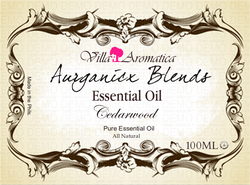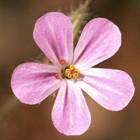HAIR GROWTH FORMULAS

The Essential Oils
Essential oils can be thought of as the 'active ingredients' in your formulas. Choose one or more and add them at the recommended concentrations to your carrier oil(s). Massage your blend into the scalp daily. Some recommend wrapping the scalp with a warm, moist towel afterward to open the pores and enhance absorption. This can be done before bed, and you may want to use a cover for your bedding to provide protection from the oils. Essential oils can also be added to your current shampoos and conditioners.
Basil is a beneficial herb that stimulates and promotes hair growth. One can easily make Basil hair oil to massage into the scalp. This massage promotes healing, health, and improves scalp circulation which, in turn, promotes hair growth. Basil is good when used together with fenugreek and ivy burdock herbs.
Rosemary has effect in stimulating the hair-bulbs to renewed activity and preventing premature baldness.
Arnica - A hair rinse prepared with arnica extract has been used to treat alopecia neurotica.
Sage - A strong infusion of sage used as a hair rinse may darken hair color and help reduce hair loss.
Bay helps your hair grow. If you have dull hair, this essential oil can restore it. It is also good for dandruff problems. For stimulating your hair health you can add three drops of bay essential oil to the shampoo you regularly uses.
The best carrier oil to choose would be jojoba oils.
Jojoba oils has healing properties for damaged and breaking hair. This truly is one of the best carrier oils for hair loss due to breakage.
You can try by adding 4 – 10 drops of essential oils mention with 1 ounce of jojoba oils or other carrier oil of your choice.
Heat the hair oil by placing the bottle of oil in a bowl of hot water. Apply the oil to the scalp and massage through the rest of the hair.
Essential oils can be thought of as the 'active ingredients' in your formulas. Choose one or more and add them at the recommended concentrations to your carrier oil(s). Massage your blend into the scalp daily. Some recommend wrapping the scalp with a warm, moist towel afterward to open the pores and enhance absorption. This can be done before bed, and you may want to use a cover for your bedding to provide protection from the oils. Essential oils can also be added to your current shampoos and conditioners.
Basil is a beneficial herb that stimulates and promotes hair growth. One can easily make Basil hair oil to massage into the scalp. This massage promotes healing, health, and improves scalp circulation which, in turn, promotes hair growth. Basil is good when used together with fenugreek and ivy burdock herbs.
Rosemary has effect in stimulating the hair-bulbs to renewed activity and preventing premature baldness.
Arnica - A hair rinse prepared with arnica extract has been used to treat alopecia neurotica.
Sage - A strong infusion of sage used as a hair rinse may darken hair color and help reduce hair loss.
Bay helps your hair grow. If you have dull hair, this essential oil can restore it. It is also good for dandruff problems. For stimulating your hair health you can add three drops of bay essential oil to the shampoo you regularly uses.
The best carrier oil to choose would be jojoba oils.
Jojoba oils has healing properties for damaged and breaking hair. This truly is one of the best carrier oils for hair loss due to breakage.
You can try by adding 4 – 10 drops of essential oils mention with 1 ounce of jojoba oils or other carrier oil of your choice.
Heat the hair oil by placing the bottle of oil in a bowl of hot water. Apply the oil to the scalp and massage through the rest of the hair.
Natural Treatment of Acne Using Essential Oils
Acne is one of the most persistent skin problems among both adults and teens – that's why an entire industry has developed to offer "foolproof" acne cures and treatments. Though many home remedies for acne are known to work, some of the best natural acne treatments include essential oils or aromatherapy oils, especially in combination with fatty oils like olive or sweet almond. Essential oils have been used for all kinds of cosmetic and health purposes since ancient times. The doctors of the Ancient Greeks, Romans and Egyptians were known for using essential oils and other herbal remedies as cures for almost every type of health problem – including skin conditions and to treat acne. The skin responds especially well to aromatherapy oils as a natural acne treatment because the lipid nature of the oils can penetrate easily into the skin, where the oils heal and nourish the cells and relieve inflammation.
Choosing the Best Oils for Acne and Skin Treatment The choice of a particular essential oil or a combination of oils will depend on the type of acne and on individual skin sensitivity – finding the best essential oil acne treatment can be partly trial and error until you are familiar with how your skin reacts to different oils.
It's also extremely important to purchase only therapeutic grade oils of the highest quality because lower grade oils contain additives that can worsen acne. For more information on aromatherapy oil quality, see The Real
Quality of Essential Oils.
Some of the oils that are best for treating acne include:
Choosing the Best Oils for Acne and Skin Treatment The choice of a particular essential oil or a combination of oils will depend on the type of acne and on individual skin sensitivity – finding the best essential oil acne treatment can be partly trial and error until you are familiar with how your skin reacts to different oils.
It's also extremely important to purchase only therapeutic grade oils of the highest quality because lower grade oils contain additives that can worsen acne. For more information on aromatherapy oil quality, see The Real
Quality of Essential Oils.
Some of the oils that are best for treating acne include:
- melaleuca
- geranium
- vetiver
- lavender
- patchouli or patchouly
- chamomile
- rosewood
- sandalwood
- cedarwood
- eucalyptus
- frankincense
Applying Essential Oils to Cure Acne
Neat: Essential oils can be applied neat (or pure, without dilution) on the skin – but only if there is no skin sensitivity and if the oils being used as a natural acne treatment are completely pure and known to contain no additives. Anything added to a pure essential oil may cause skin reactions and worsen acne (see link above).
Diluted in Oil: Although it seems counterintuitive, fatty oils like olive oil, jojoba, sweet almond oil, and coconut oil can be healing to acne. Although acne is oily, it is often caused by skin dryness that forces cells to overproduce the natural oils of the skin. Using extra virgin olive oil (or another natural, organic oil) on the skin in a mixture with a few drops of essential oil can be very helpful as an acne cure.
Steam: A home acne remedy that feels like a day at the spa! All that's needed is a large bowl, a towel, hot water and a few drops of essential oil. Boil about two cups of water, then pour the hot water and essential oil into the bowl. Bend face over the bowl and cover your head (and the bowl) with the towel, and let the aromatic steam do its work on facial acne.
Ointments and Moisturizers: Essential oils can be added to facial moisturizer or skin acne treatments, but be very careful in so doing. Anything with synthetic ingredients can interact with pure aromatherapy oils in ways that can cause acne, not help cure it.
Reference:
Essential Science Publishing (compiled by), Essential Oils Desk Reference, 2nd Edition. USA, Essential Science Publishing, 2001.
Diluted in Oil: Although it seems counterintuitive, fatty oils like olive oil, jojoba, sweet almond oil, and coconut oil can be healing to acne. Although acne is oily, it is often caused by skin dryness that forces cells to overproduce the natural oils of the skin. Using extra virgin olive oil (or another natural, organic oil) on the skin in a mixture with a few drops of essential oil can be very helpful as an acne cure.
Steam: A home acne remedy that feels like a day at the spa! All that's needed is a large bowl, a towel, hot water and a few drops of essential oil. Boil about two cups of water, then pour the hot water and essential oil into the bowl. Bend face over the bowl and cover your head (and the bowl) with the towel, and let the aromatic steam do its work on facial acne.
Ointments and Moisturizers: Essential oils can be added to facial moisturizer or skin acne treatments, but be very careful in so doing. Anything with synthetic ingredients can interact with pure aromatherapy oils in ways that can cause acne, not help cure it.
Reference:
Essential Science Publishing (compiled by), Essential Oils Desk Reference, 2nd Edition. USA, Essential Science Publishing, 2001.

